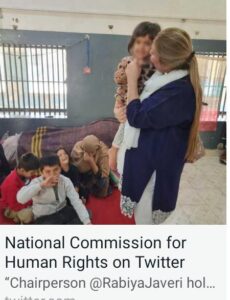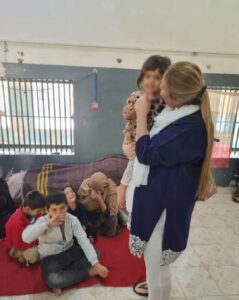A report has been prepared detailing the situation for Afghan women and their children currently being held in detention facilities.
The National Commission for Human Rights (NCHR) in collaboration with the Legal Aid Office conducted an on-site visit to Karachi Central Jail following a recent combing operation by Law Enforcement Agencies in Sindh targeting Afghan nationals residing in the country illegally.
Islamabad(imrana komal)
The National Commission for Human Rights (NCHR) in collaboration with the Legal Aid Office conducted an on-site visit to Karachi Central Jail following a recent combing operation by Law Enforcement Agencies in Sindh targeting Afghan nationals residing in the country illegally. A report has been prepared detailing the situation for Afghan women and their children currently being held in detention facilities.

NCHR’s team was led by Chairperson Rabiya Javeri Agha and the Legal Aid Office was represented by Legal Aid Society’s CEO, Haya Zahid. They met with Afghan women and children being held and listened to their ordeals and the Legal Aid Office’s team would later conduct interviews with inmates. The questionnaire administered aimed to find information on demographics, whether these Afghans possessed Proof of Registration (PoR) cards and if they had legal representation.
Of the total 143 interviews conducted in YOIS, Women’s Prison and Central Prison in Karachi, 44% are juveniles, 39.8% women and 16% men. Of these an overwhelming majority i.e., 75.5% had arrived in Pakistan in 2022. Most commonly cited reason for arrival in Pakistan for Afghan women was access to better medical facilities whereas adult males and juveniles stated that the availability of better work opportunities was their primary reason for coming to Pakistan.
The on-site visit also found the high number of Afghan Women and children being held is overwhelming the prison and forcing it to function beyond its capacity of 300. Furthermore, the interviews conducted found a significant majority of Afghans interviewed wished to return home. The report prepared by the LAO and NCHR issue has put forth a number of policy recommendations to help the foreign nationals being detained and limit prisons from operating above capacity.

On the basis of the report the following is recommended: A strong liaison must be established between the Prison Administration and the Afghan mission in Pakistan in order to ensure safe and immediate return of these people as stipulated by section 14 B of the Foreigners Act 1946. Secondly, greater sensitivity needs to be shown by the Government authorities. Police must show compassion in the exercise of their power, judiciary may look to ensure the speedy trial of such persons as well. Where sentences are to be awarded, they may be within a minimum time period or they may be token sentences such as being
detained until the rising of the court.
NCHR is an independent, federal statutory body established under the National Commission for Human Rights Act, 2012. It is the outcome of Pakistan’s Constitutional commitments and its international treaty commitments to promote and protect human rights. Section 9 (a) of the NCHR Act, 2012 endows the Commission with the power to inquire suo motu or upon petitions by victims or any person on their behalf, into complaints of (i) violation of human rights or abetment thereof; or (ii) negligence, in the prevention of such violation, by a public servant.

